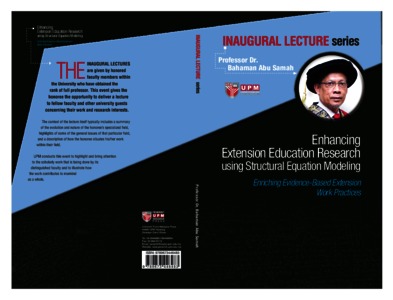Citation
Abu Samah, Bahaman
(2016)
Enhancing extension education research using structural equation modeling: enriching evidence-based extension work practices.
[Inaugural Lecture]
Abstract
Amidst the increasing global demand for food, health, social, economic and political security, the need for new knowledge and technologies initiated by higher learning as well as other research and development institutions is undeniably significant. The transfer of such knowledge and technologies takes place systematically through the support of impactful, effective and efficient extension work practices. The continuous challenge that awaits extension professionals is to ensure that the knowledge and technology transfer process is not only demand-driven, but most
importantly, research-driven and evidence-based. Research-driven and evidence-based extension work practices can scientifically complement the demands of the community and industry. Poor research and extension work practice linkages will leave the community and industry unfamiliar with new knowledge and technologies. This calls for an enhancement of extension education research to enrich evidence-based extension work practices. This gap needs to be addressed by utilizing appropriate research and statistical applications that can help extension professionals to explain technical findings in a simple and straightforward manner to their clients. Through evidence-based extension work practices,
extension work professionals can connect clients with research-based information, which will eventually improve their overall well-being. Current and future trends in extension work practices call for more participatory knowledge and technology transfer approaches as compared to the old 'top down' model. Extension professionals should thus equip themselves with knowledge on adult education
and extension education research, as well as substantial technical knowledge in planning, implementation and evaluation of extension programs. Given the need for a combination of research-driven, participatory and demand-driven extension work practices, this inaugural lecture will focus on how extension education research and organizational extension work practices can be enhanced through the utilization of appropriate statistical applications,
specifically Structural Equation Modeling (SEM). Based on my
personal and professional knowledge and experience, the first part of this lecture will be an elaboration on how extension education stakeholders can take advantage of the powerful statistical analyses provided by Structural Equation Modeling (SEM) in their research and development projects. Secondly, I will highlight the importance of equipping extension professionals with adequate knowledge and skill in the application and interpretation of SEM outputs. Finally, I will address how the incorporation of SEM analysis can lead to better development and enrichment of evidence-based extension work practices. Malaysia and the world are faced with the task of providing more evidence-based extension education work practices. This is
where research and extension linkages need to utilize cutting edge analysis tools that can provide more objective and tangible evidence to inform extension professionals on the impact of their work with the community and industry. The use of empirical evidence in evaluating the impact of extension education programs must be embraced by stakeholders at all levels. Future extension education
work and research will go beyond reporting feedback from clients and partners and calculating income generated from extension collaboration. By making use of tangible evidence to inform clients, which includes policy makers, researchers and extension practitioners at all levels (Ministries, Higher Learning Institutions, Research and Extension agencies and other relevant bodies) can provide more rigorous input to improve and advance the overall
research-extension-utilization ecosystem. Hence, in this inaugural lecture, I will humbly share how Structure Equation Modeling (SEM) can enhance extension education research and ultimately enrich evidence-based extension work practices.
Download File
![[img]](http://psasir.upm.edu.my/51649/1.hassmallThumbnailVersion/20170731173849Enhancing_Extension_Education_Research_using_Structural_Equation_Modelling_.pdf)  Preview |
|
Text
20170731173849Enhancing_Extension_Education_Research_using_Structural_Equation_Modelling_.pdf
Download (4MB)
| Preview
|
|
Additional Metadata
Actions (login required)
 |
View Item |

